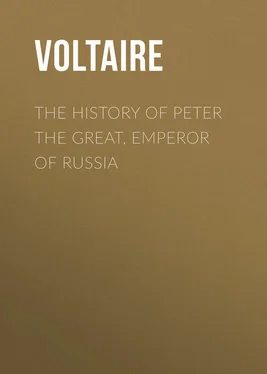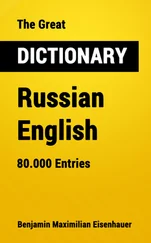Voltaire - The History of Peter the Great, Emperor of Russia
Здесь есть возможность читать онлайн «Voltaire - The History of Peter the Great, Emperor of Russia» — ознакомительный отрывок электронной книги совершенно бесплатно, а после прочтения отрывка купить полную версию. В некоторых случаях можно слушать аудио, скачать через торрент в формате fb2 и присутствует краткое содержание. Жанр: История, literature_18, foreign_prose, на английском языке. Описание произведения, (предисловие) а так же отзывы посетителей доступны на портале библиотеки ЛибКат.
- Название:The History of Peter the Great, Emperor of Russia
- Автор:
- Жанр:
- Год:неизвестен
- ISBN:нет данных
- Рейтинг книги:3 / 5. Голосов: 1
-
Избранное:Добавить в избранное
- Отзывы:
-
Ваша оценка:
- 60
- 1
- 2
- 3
- 4
- 5
The History of Peter the Great, Emperor of Russia: краткое содержание, описание и аннотация
Предлагаем к чтению аннотацию, описание, краткое содержание или предисловие (зависит от того, что написал сам автор книги «The History of Peter the Great, Emperor of Russia»). Если вы не нашли необходимую информацию о книге — напишите в комментариях, мы постараемся отыскать её.
The History of Peter the Great, Emperor of Russia — читать онлайн ознакомительный отрывок
Ниже представлен текст книги, разбитый по страницам. Система сохранения места последней прочитанной страницы, позволяет с удобством читать онлайн бесплатно книгу «The History of Peter the Great, Emperor of Russia», без необходимости каждый раз заново искать на чём Вы остановились. Поставьте закладку, и сможете в любой момент перейти на страницу, на которой закончили чтение.
Интервал:
Закладка:
The czar immediately set about fortifying Azoph, built strong forts to protect it, and made a harbour capable of holding large vessels, with a design to make himself master of the Streights of Caffa, or the Cimmerian Bosphorus, which commands the entrance into the Pontus Euxinus, or Black Sea; places famous in ancient times, by the naval armaments of Mithridates. He left thirty-two armed saicks before Azoph, 40 40 Le Fort's Memoirs.
and made all the necessary preparations for fitting out a fleet against the Turks, to consist of nine ships of sixty guns, and of forty-one, from thirty to fifty. He obliged his principal nobles, and the richer merchants, to contribute towards this armament; and thinking that the estates of the clergy ought to help towards the common cause, he obliged the patriarch, the bishops, and principal clergy, to pay down a sum of ready money to forward this expedition, in honour of their country, and the advantage of the Christian faith. The Cossacks were employed in building a number of those light boats in use amongst them, and which were excellent for the purpose of cruising on the coast of Crim Tartary. The Ottoman empire was alarmed at this powerful armament; the first that had ever been attempted on the Palus Mæotis. The czar's scheme was to drive the Turks and the Tartars for ever out of the Taurica Chersonesus, and afterwards to establish a free and easy commerce with Persia through Georgia. This is the very trade which the Greeks formerly carried on to Colchos, and to this peninsula of Crim Tartary, which Peter now seemed on the point of conquering.
Having subdued the Turks and the Tartars, he was willing to accustom his people to splendid shows as well as to military labour. He made his army to enter into Moscow, under triumphal arches, in the midst of superb fire-works, and every thing that could add to the lustre of the festival. The soldiers who had fought on board the Venetian saicks against the Turks, and who were a distinct corps of themselves, marched first. Marshal Sheremeto, the generals Gordon and Schein, admiral Le Fort, and the other general officers, all took the precedence of their monarch in this procession, who declared he had no rank in the army, being desirous to convince the nobility, by his example, that the only way to acquire military preferment, was to deserve it. 41 41 It is in consequence of this glorious and equitable distinction, that at this day we find nobility gives no precedence in the court of Russia; nor can the son of a prince appear there in any other rank, than that which his situation in the army gives him; while a private citizen, who by his merit has raised himself above his condition, receives all the honours due to his post; or more properly speaking, to the merit which obtained him that post. A reputation of this kind would, methinks, be attended with great advantages, both in England and France, as it would be a means to raise in the youth of all ranks, a virtuous and noble emulation.
This triumphal entry seemed somewhat a-kin to those of the ancient Romans, in which the conquerors were wont to expose the prisoners they had taken, to public view, and sometimes put them to death: in like manner, the slaves, taken in this expedition, follow the army; and the deserter Jacob, who had betrayed them, was drawn in an open cart, in which was a gibbet, to which his body was fastened after he had been broke upon the wheel.
On this occasion was struck the first medal in Russia, with this remarkable legend, in the language of the country. 'Peter the First, august emperor of Muscovy.' On the reverse was the city of Azoph, with these words; 'Victorious by Fire and Water.'
Peter felt a sensible concern in the midst of all these successes, that his ships and gallies in the sea of Azoph, had been built entirely by the hands of foreigners; and wished as earnestly to have a harbour in the Baltic Sea, as upon the Pontus Euxinus.
Accordingly, in the month of March 1697, he sent threescore young Russians of Le Fort's regiment, into Italy, most of them to Venice, and the rest to Leghorn, to instruct themselves in the naval art, and the manner of constructing gallies. He likewise sent forty others into Holland, 42 42 General Le Fort's MSS.
to learn the method of building and working large ships: and others likewise into Germany, to serve in the land forces, and instruct themselves in the military discipline of that nation. At length he took a resolution to absent himself for a few years from his own dominions, in order to learn how to govern them the better. He had an irresistible inclination to improve himself by his own observation and practice in the knowledge of naval affairs, and of the several arts which he was so desirous to establish in his own country. He proposed to travel incognito through Denmark, Brandenburg, Holland, Vienna, Venice, and Rome. France and Spain were the only countries he did not take into his plan; Spain, because the arts he was in quest of, were too much neglected there; and France, because in that kingdom they reigned with too much ostentation, and that the parade and state of Lewis XIV. which had disgusted so many crowned heads, ill agreed with the private manner in which he proposed to travel. Moreover, he was in alliance with most of the powers, whose dominions he intended to visit, except those of France and Rome. He likewise remembered, with some degree of resentment, the little respect shewn by Lewis XIV. to his embassy in 1687, which had proved more famous than successful; and lastly he already began to espouse the cause of Augustus, elector of Saxony, with whom the prince of Conti had lately entered into a competition for the crown of Poland.
CHAP. IX
Travels of Peter the Great.
1697.
Having thus determined to visit the several countries and courts above-mentioned in a private character, he put himself into the retinue of three ambassadors, in the same manner as he had before mingled in the train of his generals at his triumphant entry into Moscow.
43 43 The Petersburg Memoirs, and Memoirs of Le Fort.
The three ambassadors were, general Le Fort, the boyard Alexis Gollowin, commissary-general of war, and governor of Siberia, the same who signed the perpetual treaty of peace with the plenipotentiaries of China, on the frontiers of that empire; and Wonitzin, diak, or secretary of state, who had been long employed in foreign courts. Four principal secretaries, twelve gentlemen, two pages for each ambassador, a company of fifty guards, with their officers, all of the regiment of Preobrazinski, composed the chief retinue of this embassy, which consisted in the whole of two hundred persons; and the czar, reserving to himself only one valet de chambre, a servant in livery, and a dwarf, mingled with the crowd. It was a thing unparalleled in history, for a king of five-and-twenty years of age, to quit his dominions, in order to learn the art of governing. His victory over the Turks and Tartars, the splendour of his triumphant entry into Moscow, the number of foreign troops attached to his service, the death of his brother John, his co-partner in the empire, and the confinement of the princess Sophia to a cloister, and above all the universal respect shewn to his person, seemed to assure him the tranquillity of his kingdom during his absence. He intrusted the regency in the hands of the boyard Strechnef, and the knez or prince Romadonowski, who were to deliberate with the rest of the boyards in cases of importance.
Two troops raised by general Gordon remained behind in Moscow, to keep every thing quiet in that capital. Those strelitzes, who were thought likely to create a disturbance, were distributed in the frontiers of Crim Tartary, to preserve the conquest of Azoph, and to check the incursions of the Tartars. Having provided against every incident, he gave a free scope to his passion and desire of improvement.
Читать дальшеИнтервал:
Закладка:
Похожие книги на «The History of Peter the Great, Emperor of Russia»
Представляем Вашему вниманию похожие книги на «The History of Peter the Great, Emperor of Russia» списком для выбора. Мы отобрали схожую по названию и смыслу литературу в надежде предоставить читателям больше вариантов отыскать новые, интересные, ещё непрочитанные произведения.
Обсуждение, отзывы о книге «The History of Peter the Great, Emperor of Russia» и просто собственные мнения читателей. Оставьте ваши комментарии, напишите, что Вы думаете о произведении, его смысле или главных героях. Укажите что конкретно понравилось, а что нет, и почему Вы так считаете.












